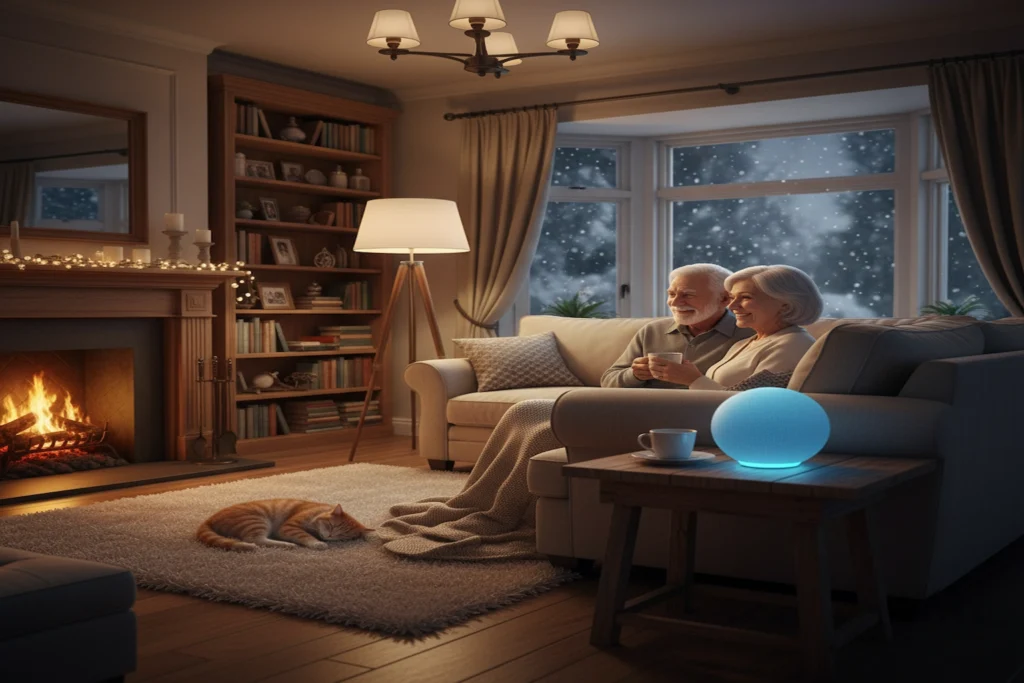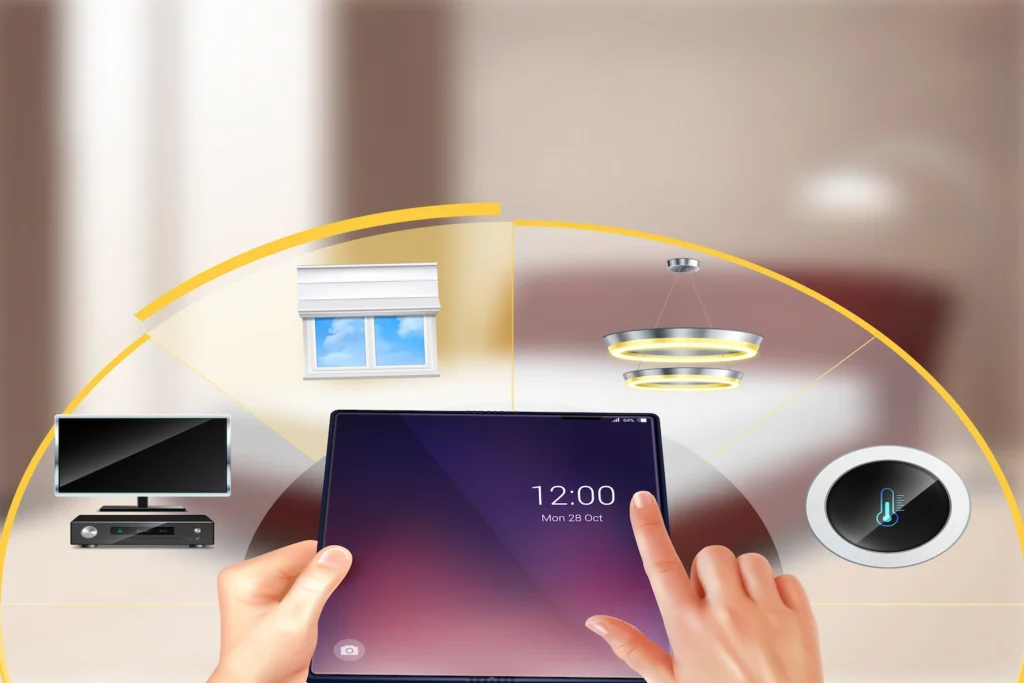Growing older never means giving up your comfort or independence. Today, smart home devices for seniors make it easier for all older adults to live safely and confidently in their homes.
From smart lights that guide you the way at night to voice assistants that remind you to take medicine, these tools quietly support daily life. They don’t just add convenience, they bring peace of mind to both seniors and their families.
Modern homes are getting smarter every year. And in 2025, even the simplest gadgets can make a big difference. They help in turning your small tasks into effortless routines. Imagine saying, “Good morning, Alexa,” and your room lights up instantly. Then, you feel the temperature adjust automatically, and your coffee starts brewing.
For seniors, these changes go beyond luxury. They’re mostly about safety, comfort, and independence. The right smart home devices for seniors can help them to prevent falls and manage health. It also helps them to keep their loved ones connected without any complicated setups or constant assistance.
This guide explores the best options available today that are simple, practical, and designed for real homes.
Why Smart Homes Matter for Seniors
Aging never means giving up independence. Smart devices let your seniors stay in their homes longer with safety features built right in. Some devices, like voice commands, motion sensors, and alert systems, simplify your daily life. To handle these devices, no tech degree is required, as they are easy to use by any adult.
Whether it’s turning off lights, adjusting room temperature, or calling for help, the right tools help adults at home to easily do it. The smart gadgets reduce risks and support your comfort.
Essential Smart Home Devices for Seniors
1. Smart Speakers and Voice Assistants
When it comes to convenience, the best smart home device for seniors is always a voice assistant. Devices like Alexa, Google Nest, or Echo Show respond to simple voice commands. They help you like your personal assistant. They provide reminders and weather updates and inform you about the phone calls and who is calling and whether you want to answer or hang out. They also connect you on the call just by a simple voice command, “call …..” and even they control other smart devices.
For example, the best smart home device for senior citizens Alexa setup, can remind someone to take medication on time. It also alerts the family in any case of emergency. A hands-free control gives seniors freedom. It also reduces fall risks caused by moving around unnecessarily.
2. Smart Lighting Systems
Smart lights that adjust automatically can prevent most of the accidents in the home. Motion sensors switch the lights on or brighten the light if it is currently dim when someone enters a room. One of the best qualities of smart bulbs is that they can dim, brighten, or change color to improve visibility for aging eyes. You can also control them with voice assistants or an app, reducing the need to walk around to flip switches.
3. Smart Locks and Video Doorbells
Home safety always starts at the door. Smart locks and video doorbells allow seniors to see who’s there without opening the door. They can unlock the door for caregivers or family remotely, without any hassle. This gives you peace of mind, having concern for your elder being at home alone, and also cuts down on potential security risks.
4. Fall Detection Sensors and Wearable Alerts
Falls are one of the biggest risks for older adults. Smart sensors and wearables can detect sudden movements or inactivity. When a fall happens, alerts are sent automatically to caregivers or emergency contacts. These devices can be life-saving, especially for seniors living alone.
5. Smart Thermostats
Temperature changes can affect your comfort and health. Smart thermostats keep rooms at the right temperature always. They also learn personal preferences by analyzing your changes daily. They can be controlled by voice or through automation. For seniors with limited mobility, this means no more walking across the house to adjust the dial.
6. Smart Plugs and Switches
Small but powerful. Smart plugs can turn normal devices, like lamps or coffee makers, into smart ones. Seniors can schedule them or control them remotely. This makes routine tasks easier and safer, especially for those with arthritis or mobility issues.
7. Smart Pill Dispensers and Medication Reminders
Forgetting to take medication is a common issue among all older adults. Smart dispensers and reminder systems can help them by beeping, flashing, or sending notifications when it’s time for a dose. Some can even lock compartments to prevent double-dosing. When paired with Alexa, these reminders can be spoken out loud at set times, a perfect use of the best smart home device for seniors Alexa offers.
8. Smart Health Monitoring Devices
From blood pressure and glucose monitors to smartwatches that track vitals, these tools make health management simpler than ever.
9. Smart Smoke and Carbon Monoxide Detectors
Traditional alarms work, but smart ones notify your phone too. If smoke or gas is detected, they alert both the senior and their emergency contacts. This helps even if the person isn’t near the alarm or has hearing issues.
10. Smart Smoke & Carbon Monoxide Detectors
These detectors send alerts straight to phones in case they detect smoke in the home. It reduces the risk of fire in the home. That’s vital for seniors who might not hear traditional alarms in time.
Daily Life Made Easier with Smart Automation

Imagine a “Very Good Morning” command that turns on lights, starts the coffee maker, and reads the weather. Or a “Have a Sweet Dream” command will lock the doors, adjust the thermostat, and turn off or dim the lights. That’s how smart home devices for seniors create comfort while reducing effort.
Want to see how smart homes can work for everyone? Check out our guide, Top 10 Smart Home Devices Every American Should Own for a complete list of 2025 essentials.
How to Choose the Right Smart Home Setup for Seniors
Choosing the Right Smart Device
Not every gadget fits every person. Choose based on simplicity and need. Go for devices with voice support and minimal setup by avoiding tools that need frequent updates. Always think of safety and privacy before fancy features.
- Start small: Begin with one or two important devices like lights or voice assistants.
- Ease of use: Pick devices with simple apps and clear voice commands.
- Support: Choose brands with strong customer service and reliable updates.
- Safety first: Always check privacy policies and data control settings.
- Expand gradually: Add more devices as the user grows comfortable.
Privacy and Security Tips
Smart devices collect your data regularly. Set up strong passwords and enable two-factor authentication. Change passwords regularly. Regularly update your device software to patch security gaps. For seniors, choose devices that store data locally or allow privacy customization. A little awareness keeps smart homes both helpful and secure.
Common Challenges and Solutions
| Challenge | Solution |
| Tech overwhelm | Start with basic functions only |
| Wi-Fi reliability | Use mesh systems or strong routers |
| Fear of technology | Demonstrate benefits with one simple task |
| Cost concerns | Prioritize essential devices first |
What’s Ahead for Seniors and Smart Homes
Future smart devices will get more intuitive. AI-powered sensors can detect falls, irregular movement, and even health issues before they become serious. Voice control will continue to simplify interactions, making smart homes a safe space for all ages.
FAQs
What is the best smart device for seniors?
Voice assistants like Alexa or Google Nest are among the best smart home devices for seniors. They simplify control over lighting, communication, and safety systems.
What are the best assistive devices for seniors?
Assistive devices include fall detectors, smart pill dispensers, motion-sensor lights, and video doorbells. These improve independence and reduce accident risks.
How can I monitor my elderly parents at home?
You can use cameras, motion sensors, or smart health monitors. Many systems send live alerts or reports directly to your phone, helping you check on parents remotely.
What is the most important device that can help elderly people?
A smart speaker like Alexa or Google Assistant tops the list. It combines voice control, emergency help, reminders, and entertainment, making daily life easier and safer.
Final Thoughts
Technology doesn’t replace care, but it helps in supporting it. Smart home devices for seniors empower independence while keeping families connected and reassured. With thoughtful setup and gradual use, any home can become safer, smarter, and senior-friendly.


